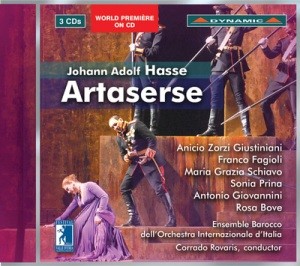The text for Artaserse is by Metastasio, that opera seria funster who probably made a better living than most of the composers for whom he penned librettos: more than 90 settings of this one alone are documented. Leonardo Vinci was the first—he commissioned Metastasio—and Hasse was second; after that, Graun, Galuppi, Gluck, Arne, and J. C. Bach joined the bandwagon, making changes large and small to Metastasio’s original.
The plot? The plot: Prince Artaserse (tenor) and General Megabise (countertenor, originally a castrato) are both in love with Semira (mezzo-soprano), who returns Artaserse’s love. Semira is the sister of Arbace (countertenor, originally a castrato), a friend to Artaserse; their father, Artabano (mezzo-soprano, originally a castrato) is a higher-up in Artaserse’s army, but is also a traitor to him. Mandane (soprano), daughter of Artaserse, is in love with Arbace, and vice-versa. Arbace is accused of the death of a character who never appears and of attempting to kill Artaserse, while in fact it is his father, Artabano, with Megabise’s help, who is guilty. Everything gets sorted out; Artabano is forgiven in the end.
Four hours of music, more than two dozen arias—all in da capo form, one of which is by Vivaldi—should be taken in smallish doses. (There is one duet.) The recits, though delivered with the drama that one should find in a live performance such as this one, do not hold much interest on their own unless you’re obsessed with the plot’s many ins-and-outs; the drama-filled accompanied recits found in some Handel operas are absent here.
But the arias are great fun and quite lovely, and of course, quite the showpieces for the singers. The least showy role is that of Artaserse himself, a rare tenor role in Baroque opera: his music is stately and straightforward and well sung by Anicio Zorzi Giustiniani. The much-loved Semira is sung by mezzo Rosa Bova with accuracy, a somewhat plummy tone, and not much else.
Star mezzo Sonia Prina, once over the too-quick tempo of her Vivaldi aria (“S’impugni la spada”) is a marvelously colorful Artabano, wicked and virtuosic. Maria Grazia Schiavo uses her lovely soprano well as the conflicted, confused-over-Arbace Mandane, with fine passagework and gleaming high notes. Megabise, a young countertenor named Antonio Giovanini, sounds dazzlingly like a female soprano, but he’s forceful and accurate nonetheless.
The opera’s center is the put-upon Arbace, sung here by Franco Fagioli in the role written for the great Farinelli. He’s a magnificent artist, whether spinning out a gorgeous melodic line in “Se al labbro” in Act 1, with real legato and beautiful trills, or attacking the almost terrifying “Parto quell pastorella”, with its 20-second, messa di voce opening note, thousands of up and down cascades, or the range (I assume the vocal line has been embellished here—even Hasse wouldn’t write such a thing), which goes from high C-sharp to the same note two octaves below.
Corrado Rovaris leads the sometimes tired-sounding but precise orchestra with occasionally flagging energy, but fine feeling for the idiom. It’s exciting enough. You’ll know if you want to hear this: I suspect I’ll play parts of it pretty often.
































